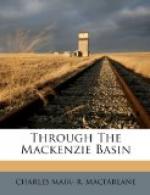At this point the issue of certificates for scrip practically ended, the total number distributed being 1,843, only 48 of which were for land.
Leaving Calling River before noon, we passed Riviere la Biche towards evening, and camped about four miles above it on the same side of the river. We were not far from the Landing, and therefore near the end of our long and toilsome yet delightful journey. It was pleasant and unexpected, too, to find our last camp but one amongst the best. The ground was a flat lying against the river, wooded with stately spruce and birch, and perfectly clear of underbrush. It was covered with a plentiful growth of a curious fern-like plant which fell at a touch. The great river flowed in front, and an almost full moon shone divinely across it, and sent shafts of sidelong light into the forest. The huge camp-fires of the trackers and canoemen, the roughly garbed groups around them, the canoes themselves, the whole scene, in fact, recalled some genre sketch by our half-forgotten colourist, Jacobi. Our own fire was made at the foot of a giant spruce, and must have been a surprise to that beautiful creature, evidently brimful of life. Indeed, I watched the flames busy at its base with a feeling of pain, for it is difficult not to believe that those grand productions of Nature, highly organized after their kind, have their own sensations, and enjoy life.
The 17th fell on a Sunday, a delicious morning of mist and sunshine and calm, befitting the day. But we were eager for letters from home, and therefore determined to push on. Perhaps it was less desecrating to travel on such a morning than to lie in camp. One felt the penetrating power of Nature more deeply than in the apathy or indolent ease of a Sunday lounge. Still there were those who had to smart for it—the trackers. But the Mecca of the Landing being so near, and its stimulating delights looming largely in the haze of their imagination, they were as eager to go on as ourselves.
The left bank of the river now exhibited, for a long distance, a wilderness swept by fire, but covered with “rampikes” and fallen timber. The other side seemed to have partially escaped destruction. The tracking was good, and we passed the “Twenty Mile Rock” before dinner, camping about fifteen miles from the Landing. Next morning we passed through a like burnt country on both sides, giving the region a desolate and forlorn look, which placed it in sinister contrast with the same river to the north.




